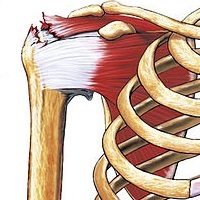Musculoskeletal injury
Editor-In-Chief: Prab R Tumpati, MD
Obesity, Sleep & Internal medicine
Founder, WikiMD Wellnesspedia &
W8MD medical weight loss NYC and sleep center NYC
| Musculoskeletal injury | |
|---|---|

| |
| Synonyms | N/A |
| Pronounce | N/A |
| Specialty | N/A |
| Symptoms | Pain, swelling, bruising, limited range of motion |
| Complications | Chronic pain, disability, osteoarthritis |
| Onset | Sudden or gradual |
| Duration | Varies (acute or chronic) |
| Types | N/A |
| Causes | Trauma, overuse, degenerative changes |
| Risks | Sports, physical activity, aging |
| Diagnosis | Physical examination, imaging studies (X-ray, MRI, CT scan) |
| Differential diagnosis | Fracture, dislocation, sprain, strain |
| Prevention | Proper technique, protective equipment, conditioning exercises |
| Treatment | Rest, ice, compression, elevation (RICE), physical therapy, surgery |
| Medication | N/A |
| Prognosis | Varies depending on severity and treatment |
| Frequency | Common |
| Deaths | N/A |
Musculoskeletal injury refers to damage of muscular or skeletal systems, which is usually due to a strenuous activity. This term is generally associated with muscle pain, joint pain, and bone pain.
Causes[edit | edit source]
Musculoskeletal injuries can be caused by a variety of factors, including:
- Physical trauma such as falls, accidents, or sports injuries
- Overuse or strain from repetitive movements
- Poor posture or ergonomics
- Aging, which can lead to degenerative conditions like arthritis and osteoporosis
Symptoms[edit | edit source]
The symptoms of a musculoskeletal injury can vary depending on the specific condition, but may include:
- Pain in the muscles, joints, or bones
- Swelling or inflammation
- Difficulty moving the affected area
- Weakness or loss of function in the affected area
Diagnosis[edit | edit source]
Diagnosis of musculoskeletal injuries typically involves a physical examination and may also include imaging tests such as X-rays, MRIs, or CT scans. In some cases, a biopsy may be needed to confirm the diagnosis.
Treatment[edit | edit source]
Treatment for musculoskeletal injuries can vary depending on the severity and location of the injury, but may include:
- Rest and immobilization of the affected area
- Physical therapy or rehabilitation exercises
- Medications to manage pain and inflammation
- Surgery in severe cases
Prevention[edit | edit source]
Prevention strategies for musculoskeletal injuries can include:
- Regular physical activity to maintain strength and flexibility
- Proper ergonomics and posture
- Safe practices during sports and physical activities
- Regular check-ups and screenings for degenerative conditions
Gallery[edit | edit source]
Musculoskeletal_injury gallery[edit | edit source]
See also[edit | edit source]
Search WikiMD
Ad.Tired of being Overweight? Try W8MD's physician weight loss program.
Semaglutide (Ozempic / Wegovy and Tirzepatide (Mounjaro / Zepbound) available.
Advertise on WikiMD
|
WikiMD's Wellness Encyclopedia |
| Let Food Be Thy Medicine Medicine Thy Food - Hippocrates |
Translate this page: - East Asian
中文,
日本,
한국어,
South Asian
हिन्दी,
தமிழ்,
తెలుగు,
Urdu,
ಕನ್ನಡ,
Southeast Asian
Indonesian,
Vietnamese,
Thai,
မြန်မာဘာသာ,
বাংলা
European
español,
Deutsch,
français,
Greek,
português do Brasil,
polski,
română,
русский,
Nederlands,
norsk,
svenska,
suomi,
Italian
Middle Eastern & African
عربى,
Turkish,
Persian,
Hebrew,
Afrikaans,
isiZulu,
Kiswahili,
Other
Bulgarian,
Hungarian,
Czech,
Swedish,
മലയാളം,
मराठी,
ਪੰਜਾਬੀ,
ગુજરાતી,
Portuguese,
Ukrainian
Medical Disclaimer: WikiMD is not a substitute for professional medical advice. The information on WikiMD is provided as an information resource only, may be incorrect, outdated or misleading, and is not to be used or relied on for any diagnostic or treatment purposes. Please consult your health care provider before making any healthcare decisions or for guidance about a specific medical condition. WikiMD expressly disclaims responsibility, and shall have no liability, for any damages, loss, injury, or liability whatsoever suffered as a result of your reliance on the information contained in this site. By visiting this site you agree to the foregoing terms and conditions, which may from time to time be changed or supplemented by WikiMD. If you do not agree to the foregoing terms and conditions, you should not enter or use this site. See full disclaimer.
Credits:Most images are courtesy of Wikimedia commons, and templates, categories Wikipedia, licensed under CC BY SA or similar.
Contributors: Prab R. Tumpati, MD






